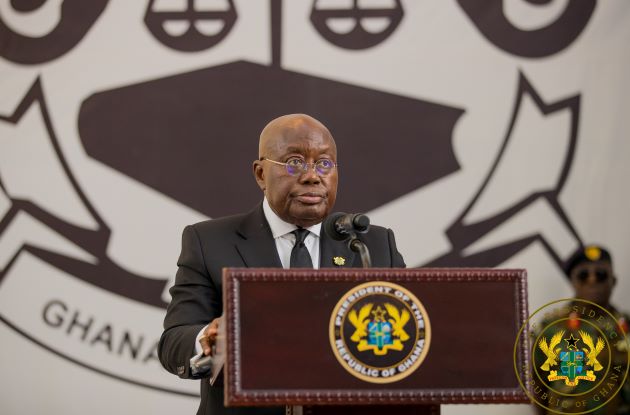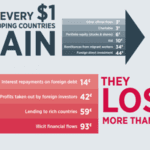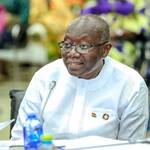Government has announced a new raft of measures to beef up existing ones to tackle the economic challenges confronting the country
Capping of statutory funds to be reviewed
It includes reviews of areas such as imports, reforms in the energy sector, capping of statutory funds, implementation of exemptions Act and a new property rate regime.
Diversifying the structure of the economy
This is part of efforts at diversifying the structure of the economy from an import-based one to a value-added exporting one is what will, in the long term, help strengthen economy.
Stabilizing cedi and fuel prices
The new measures also involve stabilizing fuel prices and the cedi, no haircut for portfolio investors, debt sustainability among others.
While soliciting the support of all Ghanaian to rescue the country from the throes of current economic crisis, President Nana Akufo-Addo acknowledged that the economy is in great difficulty.
Revealing decisions taken at the just-ended cabinet meeting, he announced review of the standards required for imports into the country, prioritise the imports, as well as review the management of foreign exchange reserves.
Rice, poultry, vegetable oil fruit juice imports to be reviewed
This, he said will be done in relation to imports of products such as rice, poultry, vegetable oil, toothpicks, pasta, fruit juice, bottled water and ceramic tiles, and others which, with intensified government support and that of the banking sector, can be manufactured and produced in sufficient quantities in Ghana.
He pledged that government will, in May 2023 review the situation saying “We must, as a matter of urgent national security, reduce our dependence on imported goods, and enhance our self-reliance, as demanded by our overarching goal of creating a Ghana Beyond Aid”.
“Much as we believe in free trade, we must work to ensure that the majority of goods in our shops and market places are those we produce and grow here in Ghana.
“That is why we have to support our farmers and domestic industries, including those created under the 1-District-1-Factory initiative, to help reduce our dependence on imports, and allow us the opportunity to export more and more of our products, and guarantee a stable currency that will present a high level of predictability for citizens and the business community.
“Exports, not imports, must be our mantra! Accra, after all, hosts the headquarters of the Secretariat of the African Continental Free Trade Area,” he added
Increasing local production
President Akufo-Addo promised that efforts will be increased to support local production to substitute for the cut in imports and appealed to the public to consume locally produced goods.
Rapid depreciation of the cedi
On the rapid depreciation of the cedi which is putting intolerable pressure on families and businesses, he said fresh inflows of dollars are providing liquidity to the foreign exchange market, and addressing the pipeline demand.
In addition, he said the Bank of Ghana (BoG) has given its full commitment to the commercial banks to provide liquidity to ensure the wheels of the economy continue to run in a stabilized manner, till the IMF Programme kicks in and the financing assurances expected from other partners also come in;
Oil and mining firms to save dollars in domestic banks
Also, he said government is working with BoG and the oil producing and mining companies to introduce a new legal and regulatory framework to ensure that all foreign exchange earned from operations in Ghana are, initially, paid to banks domiciled in Ghana to help boost the domestic foreign exchange market.
Sanitising foreign exchange market
He is confident that immediate measures designed to change the structure of balance of payment flows, sanitise the foreign exchange market to ensure that the banks and forex bureaus operate along international best practices, together with strengthened supervision, will go a long way to sanitize the foreign exchange market, and make it more resilient against external vulnerabilities going forward.
Fast escalating fuel prices
In response to fast escalating fuel prices at the pumps, which is caused by high crude oil prices on the world market and cedi depreciation the president announced that government is working to secure reliable and regular sources of affordable petroleum products for the Ghanaian market.
“It is expected that this arrangement, when successful, coupled with a stable currency will halt the escalation of fuel prices and bring relief to us all,” he stated.
No haircuts
He urged the public to ignore the false rumours of “haircuts”, assuring that no individual or institutional investor, including pension funds, in Government treasury bills or instruments will lose their money, as a result of ongoing IMF negotiations.
He cautioned speculators spreading falsehood that the relevant authorities are at work to tackle the development since it is a crime to do so.
Turning the crisis into an opportunity
President Akufo-Addo is optimistic Ghana shall turn this crisis into an opportunity to resolve not just the short-term, urgent problems, but the long-term structural problems that have bedeviled our economy
He explained that approaching the International Monetary Fund (IMF) to repair, in the short term, public finances, and restore balance of payments, whilst continuing to work on the medium to long-term structural changes that are at the heart of the goal of constructing a resilient, robust Ghanaian economy, and building a Ghana Beyond Aid.
According to him, the negotiations to secure a strong IMF Programme, which will support the implementation of our Post COVID-19 Programme for Economic Growth and additional funding to support the 2023 Budget and development programme, are at advanced stages and are going well.
“We are determined to secure these arrangements quickly to bring back confidence and relief to Ghanaians. We are working towards reaching a deal with the IMF by the end of the year.
“This will give further credence to the measures Government is taking to stabilize and grow the economy, as well as shore up our currency,” he said.
President Akufo-Addo announced plans to reduce total public debt to GDP ratio to some 55% in present value terms by 2028, with the servicing of our external debt pegged at not more than 18% of annual revenue also by 2028.
He said government is committed to improving the revenue collection effort, from the current tax-revenue to GDP ratio of 13% to between 18-20%, to be competitive with our peers in the West Africa Region.
He stated that government is aiming to restore and sustain macroeconomic stability within the next three to six years, with a focus on ensuring debt sustainability to promote durable and inclusive growth while protecting the poor.
Traders slapping high margins on goods
He appealed to all traders to keep an eye out for the greater good, and not try to make the utmost profits out of the current difficulties by slapping high margins on goods.




